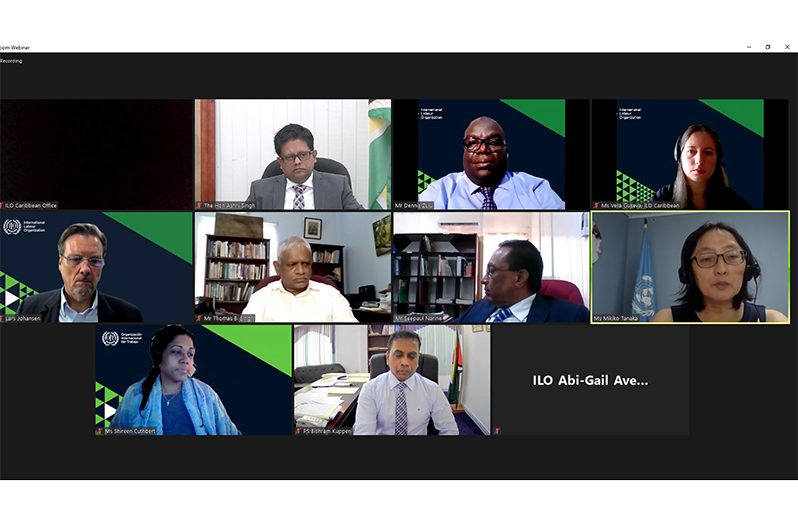— Dr Singh describes closure of sugar estates by Coalition Govt
— manner in which sugar estates were closed was ‘bad from any perspective’, ILO study concludes
THE manner in which the previous government went about shutting down four of Guyana’s sugar estates was “a bad decision from any perspective,” said Dr. Thomas B. Singh, Director of the University of Guyana’s GREEN Institute, who presented the findings of a socio-economic impact study sponsored by the International Labour Organisation (ILO) of the United Nations (UN).
The study, which was released on Thursday via a virtual forum, utilises the ‘sustainable livelihoods framework’, and focused on examining the impact that the estate closures would have had on the lives of some 7000 sugar workers and their families.
It was the former A Partnership for National Unity + Alliance For Change (APNU+AFC) government that took the decision to shut down operations at the Wales, East Demerara, Rose Hall and Skeldon Sugar Estates, pointing to poor performance of the industry; this was done between 2016 and 2017.
The report pointed to the fact that not only were the estate closures done over “a very short period of time,” but the onset of the process failed to consult the Guyana Agricultural and General Workers’ Union (GAWU), which represents the majority of GuySuCo employees.
As a result, the closures compromised the livelihoods of scores of dismissed workers, exposing many and their families to the “poverty trap”.
Of the surveys conducted, only one respondent felt that she was better off, when compared to her employment with GuySuCo. Many of the others were not as fortunate; some have managed to pursue short-term employment, while others remain without a steady income. The report indicated too that the challenges securing alternative employment have been exacerbated by the fact that most of the sugar workers were closer to a pensionable age, having spent all their lives working in the sugar industry.
“Livelihoods notably depend on capabilities, assets and economic activities. On the capabilities front, concerns faced by workers included feelings that they were too advanced in age to be considered by new employers,” the report indicated. In delivering the feature address, Senior Minister in the Office of the President with Responsibility for Finance, Dr. Ashni Singh, described the closures as being “a most callous and unconscionable act committed against workers,” as well as tens of thousands of persons living in communities that depend on the sugar industry.
Dr. Singh, addressing the forum on behalf of President, Dr. Irfaan Ali, said that the closures were done without any proper socio-economic analysis. Moreover, the minister pointed to the fact that the move conflicted with the APNU+AFC’s Commission of Inquiry (CoI) into the sugar industry, which did not recommend the closure of any estates.
SMALL AND MICRO-BUSINESSES DEVASTATED
“Sugar workers were placed on the breadline, resulting in grave hardships to these workers and their families; thousands of small and micro-businesses devastated as their livelihoods were intricately linked to these estates,” the minister posited.
He also underscored the critical role that the sugar industry has played in not only propelling a thriving economy, but also the shaping of Guyana’s demography. “The industry once had the distinction of being the largest foreign exchange earner and employer and has sustained generations of Guyanese especially those of rural Guyana. Even today the rural economy is still integrally linked to sugar production,” Dr. Singh reminded.
He further alluded to the fact that the then APNU+AFC government failed to make any provisions for the displaced sugar workers who were still saddled with mortgages and other financial and family commitments.
Dr. Singh pointed specifically to the administration’s failure to adequately issue severance payments which are guaranteed by law. The “denied and delayed” payments resulted in some sugar workers resorting to legal action to ensure that the payments owed to them are honoured.
MASTER PLAN TO REOPEN
Shortly after assuming office in August 2020, the People’s Progressive Party Civic (PPP/C) government began working towards gradually reopening the estates. In the report, the ILO underscored the importance of reopening the facilities in a manner that is sustainable.
Dr. Singh then assured the forum that the administration is moving to develop a master plan for each estate. These plans, he noted, seeks to restore the socio-economic balance of the sugar belt through recapitalisation of the industry, promoting product diversification and value-added products as well as agro-energy.
“Among the elements that are being considered within this master plan is the redirecting of GuySuCo’s efforts towards an optimised product mix, moving away from the current low value bulk-sugar market,” Dr. Singh said.
He highlighted government’s intention towards investing in the marketing of packaged sugar, which could quadruple in sales both locally and internationally over the next five years. “This would require the expansion of the Blairmont and Enmore Packaging Plants,” Minister Singh posited.
He said that the measures already being taken by government are in line with the recommendations of the recently concluded study. “The sugar industry still has an important contribution to make to Guyana. Our government is committed to the revitalisation and restructuring of the sugar industry to support a diversified and modernised sector so as to ensure its sustainability and economic viability,” Singh noted. He said that government’s commitment to bringing back the sugar industry can be reflected in the 2020 and 2021 national budgets, which has seen GuySuCo benefitting from injections of $7 billion and $2 billion, respectively.
“We envisage a sugar industry which shall continue to contribute to national development, to restoring livelihoods and boosting the rural economy,” Dr. Singh concluded.
The forum was also attended by Dennis Zulu, Director of the Decent Work Team and Office for the Caribbean of the International Labour Organisation (ILO); and Mikiko Tanaka, United Nations Resident Co-ordinator, Co-operative Republic of Guyana.




.png)









